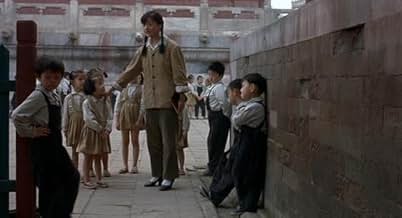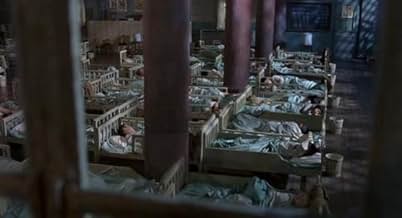Kan shang qu hen mei
- 2006
- 1 Std. 32 Min.
IMDb-BEWERTUNG
6,7/10
1587
IHRE BEWERTUNG
Füge eine Handlung in deiner Sprache hinzuA young boy starting school for the first time struggles to fit in to a strictly regimented society in in post-revolutionary China.A young boy starting school for the first time struggles to fit in to a strictly regimented society in in post-revolutionary China.A young boy starting school for the first time struggles to fit in to a strictly regimented society in in post-revolutionary China.
- Auszeichnungen
- 8 Gewinne & 3 Nominierungen insgesamt
Empfohlene Bewertungen
I've watched this film a couple of times and when you think about it, it would be very hard to make such a film and I congratulate the film makers for this effort. But to give it 1 star because it contains "gratuitous child nudity"? is sick. I am referring to a review further up here who talks about child nudity and sick people who "enjoy" that sort of thing.. You know, since you're pointing all these things out maybe you are one of those people, in denial.. One of those that also have issues with women breast-feeding in public.. I didn't even notice "child nudity".. What i saw is a film about little human beings in a boarding school. It was filmed through the eyes of a little child where everything is natural, including nakedness and bodily functions. I was like that back in Eastern Europe, slightly older, but in a similar situation and it kind of brings back some funny memories. It is this kind of righteous moralistic polemic that stirs me right up.. It is you who is troubled by this "child nudity" so stop projecting your perversity on others PLEASE! This is a great 'little' film.
I'm disappointed by all of the previous comments on this film. This film seemed to me to be far more deeply layered and textured than previous writers have given it credit for.
Having studied Chinese film (particulary the work of the 5th generation, which this film isn't part of), it's my understanding that Chinese films can't be 'read' in the same way as Western films. Due to censorship in China Chinese directors find different ways of telling stories, more often than not by dressing them up as something else. Therefore I don't believe that this film can be taken at face value. I don't believe this is a film about a small boy being sent to a kindergarten by his father and trying to earn Little Red Flowers. I think an important thing to notice is the way the boy changes. He starts off hating the regime of the school but wanting to fit in, wanting to earn a red flower, but he never does, so he deliberately alienates himself. There are many scenes where he sets himself apart from the group, and he becomes a rebel - he stirs up unrest amongst the other children. He challenges the authority. This seems to me to be deeply allegorical.
I was hoping to read some comments here that would help me understand this film, because I'm finding it puzzling. I found it a very hard film to watch, and I can't say I really enjoyed it. I found it slow and repetitive with far too much emphasis on 'peeing and pooping'. However, I'm finding it a very interesting film to think about and try to decipher. I would very much like to read other readers comments on this. What, for example, is the significance of the hospital? And the children's names? There are many many questions to be answered, and many more to be asked. By my own admission I'm not very good at reading films, but I am aware of what needs to be read!
Having studied Chinese film (particulary the work of the 5th generation, which this film isn't part of), it's my understanding that Chinese films can't be 'read' in the same way as Western films. Due to censorship in China Chinese directors find different ways of telling stories, more often than not by dressing them up as something else. Therefore I don't believe that this film can be taken at face value. I don't believe this is a film about a small boy being sent to a kindergarten by his father and trying to earn Little Red Flowers. I think an important thing to notice is the way the boy changes. He starts off hating the regime of the school but wanting to fit in, wanting to earn a red flower, but he never does, so he deliberately alienates himself. There are many scenes where he sets himself apart from the group, and he becomes a rebel - he stirs up unrest amongst the other children. He challenges the authority. This seems to me to be deeply allegorical.
I was hoping to read some comments here that would help me understand this film, because I'm finding it puzzling. I found it a very hard film to watch, and I can't say I really enjoyed it. I found it slow and repetitive with far too much emphasis on 'peeing and pooping'. However, I'm finding it a very interesting film to think about and try to decipher. I would very much like to read other readers comments on this. What, for example, is the significance of the hospital? And the children's names? There are many many questions to be answered, and many more to be asked. By my own admission I'm not very good at reading films, but I am aware of what needs to be read!
The movie begins with a cute four year old boy - Fan Qiang Qiang - being admitted by his father in a boarding kindergarten since both the parents are working at different places and are not in a position to care for him.
The kindergaten is strict in enforcing discipline and expects all students to comply with a set of regulations which extend to an extensive gamut of activities from dressing/undressing by oneself, cleanliness, cordial communciaton to others, respect to elders, maintaining order and even to timely pooping (not to forget the washing of hands thereafter). Every successful compliance by the students is rewarded with the titular little red flower which are diplayed on a scoreboard against their names and any subversion results in forfeit of a flower earned earlier.
Qiang is a free spirit by nature and finds it difficult to comply with the strict routines of the school. He is unable to dress/undress himself and does not play with other children. He is also unable to get over the habit of wetting his bed which results in him being ridiculed as "the king of bedwetting" by other students. Consequently, he is unable to earn any little red flower which is so coveted. When his repeated attempts to conform and fit into his desginated role & behaviour fail, Qiang feels enormous frustration which pushes him down the road of being an aggressive rebel. The rest of the movie narrates how this conflict between a rebellious Qiang and the disciplinarian kindergarten unfolds.
This is a simple movie which, on the face of it, successfully captures the lives of the tiny tots in a rich canvas sparkling with laughter, fun, frolic, tensions, frustrations, helplesness, sadness as experienced by these cute little toddlers. At a deeper and not-so-subtle level, this movie represents a metaphor for the state of Chinese society under the Communist regime. It portrays the simmering conflict in the society between the innate tendency of every citizen to seek to establish their individuality and the efforts of a seemingly kind, yet oppressive state, which tries to micro-monitor as well as manage the affairs of individuals, through a defined regimen, for what it feels is for a loftier goal of collective order and resultant peace. In the process, any expressions of individuality are construed as a subversion of the carefully engineered public order and is brutally subjugated & crushed.
Through the struggles of his charming little protaganist, Qiang, the director, Zhang Yuan, has successfully captured this continuing conflict between conformity and individuality which permeats the Chinese society. He must also be commended for eliciting such authentic and believable performances (if one can call them so, for they appear so natural) from his cute little cast, especially the adorable and expressive Dong Bowen who plays the young Qiang.
The open-ended finale of the movie is apt for it throws several unanswered questions at the protaganist as well as the viewer and initaites a train of thought on the central conflict portrayed in the movie.
Clocking just about ninety minutes, this movie is short, subtle, highly engaging and raises several questions for the viewer on the merits of conformity, group mentality, need for individuality, the conflict between a society steeped on confirmity & group mentality when faced with expressions of individual freedom as well as the effects of such conflicts on individual members of such society.
The kindergaten is strict in enforcing discipline and expects all students to comply with a set of regulations which extend to an extensive gamut of activities from dressing/undressing by oneself, cleanliness, cordial communciaton to others, respect to elders, maintaining order and even to timely pooping (not to forget the washing of hands thereafter). Every successful compliance by the students is rewarded with the titular little red flower which are diplayed on a scoreboard against their names and any subversion results in forfeit of a flower earned earlier.
Qiang is a free spirit by nature and finds it difficult to comply with the strict routines of the school. He is unable to dress/undress himself and does not play with other children. He is also unable to get over the habit of wetting his bed which results in him being ridiculed as "the king of bedwetting" by other students. Consequently, he is unable to earn any little red flower which is so coveted. When his repeated attempts to conform and fit into his desginated role & behaviour fail, Qiang feels enormous frustration which pushes him down the road of being an aggressive rebel. The rest of the movie narrates how this conflict between a rebellious Qiang and the disciplinarian kindergarten unfolds.
This is a simple movie which, on the face of it, successfully captures the lives of the tiny tots in a rich canvas sparkling with laughter, fun, frolic, tensions, frustrations, helplesness, sadness as experienced by these cute little toddlers. At a deeper and not-so-subtle level, this movie represents a metaphor for the state of Chinese society under the Communist regime. It portrays the simmering conflict in the society between the innate tendency of every citizen to seek to establish their individuality and the efforts of a seemingly kind, yet oppressive state, which tries to micro-monitor as well as manage the affairs of individuals, through a defined regimen, for what it feels is for a loftier goal of collective order and resultant peace. In the process, any expressions of individuality are construed as a subversion of the carefully engineered public order and is brutally subjugated & crushed.
Through the struggles of his charming little protaganist, Qiang, the director, Zhang Yuan, has successfully captured this continuing conflict between conformity and individuality which permeats the Chinese society. He must also be commended for eliciting such authentic and believable performances (if one can call them so, for they appear so natural) from his cute little cast, especially the adorable and expressive Dong Bowen who plays the young Qiang.
The open-ended finale of the movie is apt for it throws several unanswered questions at the protaganist as well as the viewer and initaites a train of thought on the central conflict portrayed in the movie.
Clocking just about ninety minutes, this movie is short, subtle, highly engaging and raises several questions for the viewer on the merits of conformity, group mentality, need for individuality, the conflict between a society steeped on confirmity & group mentality when faced with expressions of individual freedom as well as the effects of such conflicts on individual members of such society.
If Yuan Zhang's "Little Red Flowers" isn't quite in the same class as Nicolas Philibert's masterpiece "Etre et avoir" it is still one of the best films ever made about small children in a school environment but whereas the Philibert film was a documentary this is fiction and at times the performances or 'non-performances' Zhang draws from the children are nothing short of miraculous. The setting is a boarding kindergarten in post-Revolutionary China and the central character is Fang Qiangqiang, a disruptive four year old desperate to fit in.
There's no real plot to speak of and Zhang films it as if it were a documentary with perhaps more of an emphasis on the children's toiletry habits than some people might like. Although the film is perfectly innocent and full of charm, repetitive shots of our little hero and his friends in the altogether could prove problematic to Western audiences. (The Chinese, or is it just Zhang, seem obsessed with peeing, pooping and farting). Look beyond that, however, and this is a lovely account of one little boy's need for acceptance. The title refers to the little red flowers the children are rewarded for good behavior.
There's no real plot to speak of and Zhang films it as if it were a documentary with perhaps more of an emphasis on the children's toiletry habits than some people might like. Although the film is perfectly innocent and full of charm, repetitive shots of our little hero and his friends in the altogether could prove problematic to Western audiences. (The Chinese, or is it just Zhang, seem obsessed with peeing, pooping and farting). Look beyond that, however, and this is a lovely account of one little boy's need for acceptance. The title refers to the little red flowers the children are rewarded for good behavior.
Admittedly fairly intriguing story that is blatantly an allegory for something. Presumably oppression in some country. But which one...
My enduring memory of this movie is bodily functions. A lot of lavatorial stuff and some prepubescent nudity. I'm weirded out by the teachers that take even discrete flatulence very personally.
I'm not convinced that this had anything to say beyond that oppression is exists and that its bad but I still respect how this movie waves the flag for vulgarity and raises a juvenile middle finger the authority figures that think they're so different to those they're oppressing.
It's whimsical good fun that's on the right side at least even if it falls short of being the profound statement at least one of the producers must have thought it was.
Good child actors and a sweet sense of color and composition.
My enduring memory of this movie is bodily functions. A lot of lavatorial stuff and some prepubescent nudity. I'm weirded out by the teachers that take even discrete flatulence very personally.
I'm not convinced that this had anything to say beyond that oppression is exists and that its bad but I still respect how this movie waves the flag for vulgarity and raises a juvenile middle finger the authority figures that think they're so different to those they're oppressing.
It's whimsical good fun that's on the right side at least even if it falls short of being the profound statement at least one of the producers must have thought it was.
Good child actors and a sweet sense of color and composition.
Top-Auswahl
Melde dich zum Bewerten an und greife auf die Watchlist für personalisierte Empfehlungen zu.
- How long is Little Red Flowers?Powered by Alexa
Details
Box Office
- Weltweiter Bruttoertrag
- 303.898 $
- Laufzeit
- 1 Std. 32 Min.(92 min)
- Farbe
- Sound-Mix
Zu dieser Seite beitragen
Bearbeitung vorschlagen oder fehlenden Inhalt hinzufügen





















